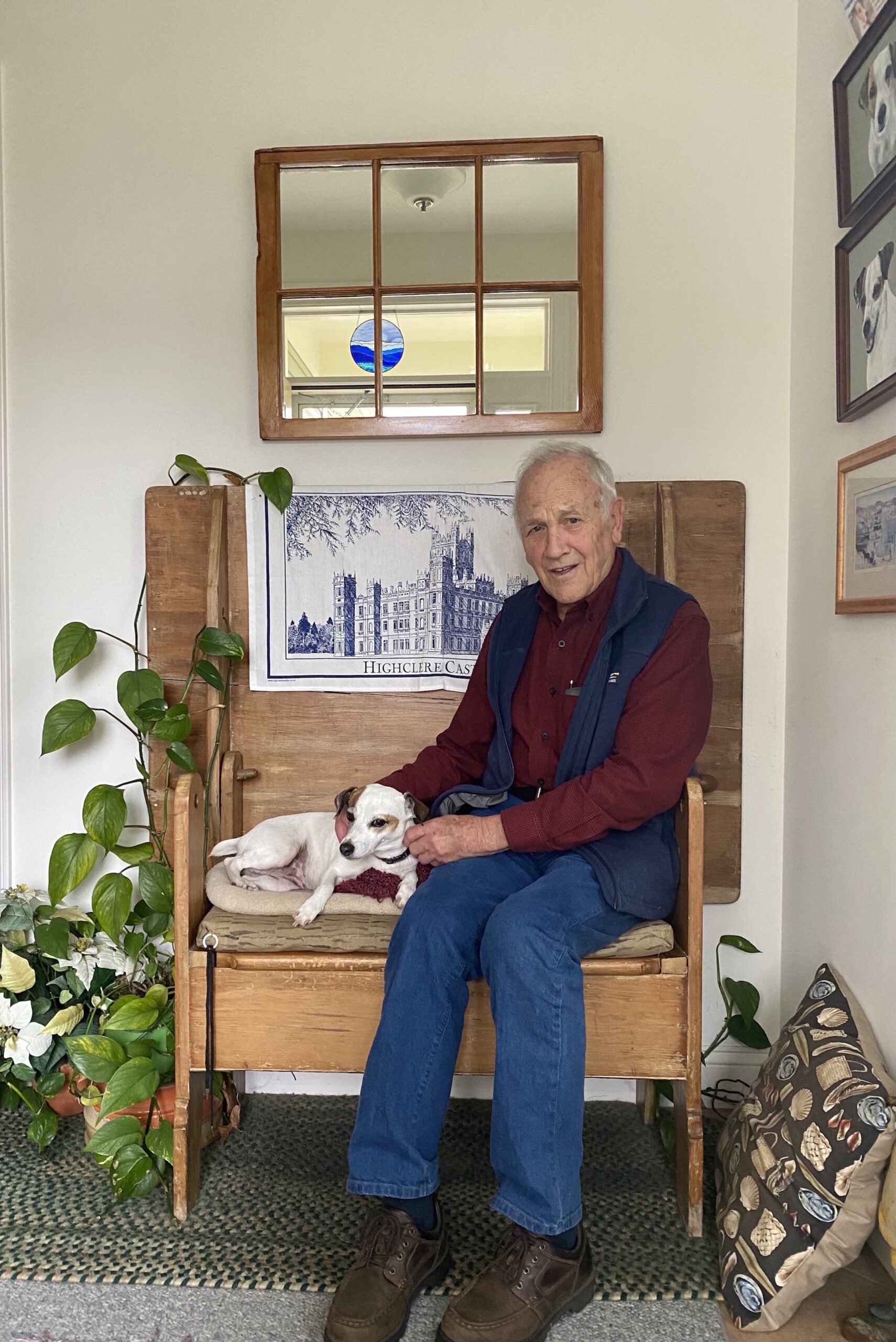John Trumper: the importance of hope in hard times
November 5, 2021
 This
piece represents the opinion of the author
.
This
piece represents the opinion of the author
.
 Aadhya Ramineni
Aadhya RamineniThis Saturday, I met John Trumper. If you read my previous column, then you are familiar with Rudy Horowitz, who is a good friend of John’s, as they both live in the Highlands, a community for elders near Bowdoin. John nonchalantly mentioned that it was his 89th birthday halfway through our interview. He expressed that, within this particular senior community, “If you are in your 80s, you are young here.”
John’s eldest son Peter Trumper was a professor of organic chemistry at the College. Unfortunately, Peter passed away from lymphoma sixteen years ago. Despite losing loved ones over the years, John approaches every day with curiosity and happiness that emanates onto those around him: “I’m still a very optimistic person who looks forward to every day, especially change.” Throughout our conversation, he repeatedly credited his happiness to the fact that he embraces change, and he acknowledged that many senior communities tend to be like “cocoons that people wrap themselves in.”
After our interview, John went to volunteer at the Maine Maritime Museum, where he delivers a weekly lecture. He later had plans to go out to dinner with his family to celebrate his 89th birthday. He noted that his volunteer work has nothing to do with his professional career as a pediatrician, nor did he know anything about Maine’s maritime before getting trained for this job. This novelty, along with the element of chance in meeting new people every week, is precisely what keeps him interested and out of an emotional rut. “The only difference between a rut and a coffin is that a coffin has depth,” John shared laughingly, alluding to a quote by American novelist Ellen Glasgow. His curiosity was evident in the way he lit up when he spoke about the town of Bath’s history as the nation’s most productive wood ship crafting facility during the 18th century.
When I challenged the retired doctor, pointing out that he must follow some routines, especially given his good health, he replied, “My dog walks me every day.” His dog, Estrellita, was born in Puerto Rico and is named for the star-like spot at the tip of her left ear. John’s wife adopted the dog about five years ago from a local shelter. About a year and a half ago, John’s wife passed away from COVID-19 while battling Alzheimer’s. John emphasized the toll the pandemic took particularly on people grappling with mental health illnesses.
John was born and brought up in Philadelphia and worked at the Children’s Hospital of Philadelphia (CHOP), later opening a private practice in Vermont where he worked until he retired in the 90s. John reflected on his career as a physician, sharing that physicians were expected to do a lot more labor in the 20th century than they are now. One of the big differences John noted is that doctors no longer give shots, diagnose and give I.V. fluids all on their own. Nowadays, the different health specialists who assist doctors in treating patients make the work of a primary care physician much easier. John also began a pediatrician exchange program as well as working locum tenens (a physician who fills in for others when a hospital is short-staffed), which allowed him to work at the grassroots level to give medical support in South America, the former Soviet Union, New Zealand and Native American reservations in both North and South Dakota, to name a few places. While living in the former Soviet Union in a small city near the Arctic circle, John got to see how Russians really lived, rather than the tourist’s version of the nation. His work was always at the grassroots level. Having experienced living in different cultures, John disappointedly addressed the racial homogeneity of the area: “Talking about diversity in this community … there’s not one, Black, brown, Asian—everybody’s Caucasian.” John also emphasized the need for more intergenerational conversation in their community, as did his friend Rudy.
John lived in Vermont for 35 years before moving to Maine. Part of the reason he was drawn here was the outdoors. After all, his favorite season is winter. He described his love of snowfall: how, when it begins to snow, you don’t know when it will stop, and the way snow muffles sound, momentarily silencing the world. Despite having Raynaud’s syndrome, which causes decreased blood circulation to his fingers, John loves the cold weather. He spoke of his stay in the Soviet Union and his even colder stay in indigenous reservations in North Dakota, where winter temperatures could get as low as -40 degrees Fahrenheit. Furthermore, John is enthusiastic about cross-country skiing. He especially enjoys the rapport and community that the sport offers. He has gone skiing every year except during the pandemic and hopes to traverse the winter woods on his skis again this year. After talking to John, I wished that the rain outside were snow and found myself looking forward to the change to colder temperatures. I will surely go cross-country skiing this winter to try something new.

Comments
Before submitting a comment, please review our comment policy. Some key points from the policy: